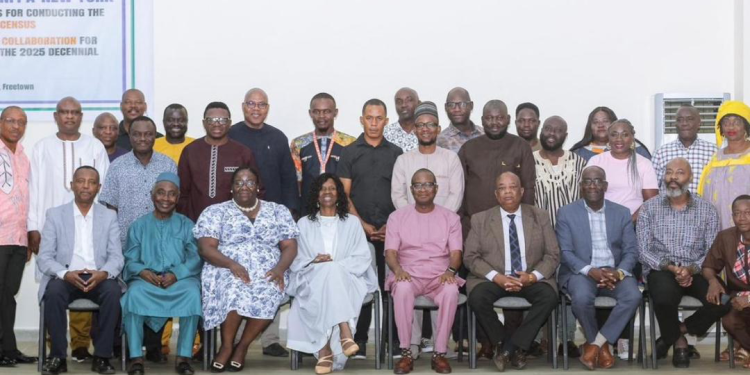By Mackie M. Jalloh
On January 13, 2025, Statistics- Sierra Leone, in partnership with the United Nations Population Fund (UNFPA), hosted an international delegation to assess the country’s preparedness for the Decennial Population and Housing Census. The delegation comprised experts from UNFPA headquarters, the United Nations Economic Commission for Africa (UNECA), and the U.S. Census Bureau.
The week-long mission was initiated to ensure that Sierra Leone has the capacity and resources to conduct the nationwide census effectively, a critical exercise for guiding policy decisions, resource allocation, and national planning.
The international mission had a clear focus on evaluating key aspects of Sierra Leone’s census preparation strategy. The assessment centred around four primary objectives:
- Technological Infrastructure: Ensuring the country’s readiness to leverage modern technology in census activities, such as data collection and management.
- Logistical Planning: Reviewing Sierra Leone’s plans for equipment procurement and recruitment of qualified personnel to facilitate the process.
- Stakeholder Engagement: Encouraging greater participation from national and local stakeholders, including civil society organizations, to foster public awareness and cooperation.
- Data Protection Standards: Assessing the adherence to global best practices in data protection to guarantee the security and confidentiality of census data.
The Decennial Population and Housing Census is a vital tool for governments and international agencies to make informed decisions. It provides updated demographic data that informs national policies on healthcare, education, infrastructure development, and social services. Accurate census data also strengthens Sierra Leone’s ability to attract investments and secure donor support for various development initiatives.
UNFPA representatives emphasized that the census would shape Sierra Leone’s development trajectory over the next decade. The mission highlighted the importance of involving communities to ensure inclusivity and capturing accurate data, especially in remote areas.
Preliminary findings from the mission highlighted in which Sierra Leone has made commendable progress, such as early stakeholder coordination and drafting of logistical frameworks. However, the delegation also identified gaps requiring urgent attention, including
- Enhancing digital infrastructure to support real-time data collection and processing.
- Securing additional funding for the procurement of specialized census equipment.
- Increasing public awareness campaigns to encourage nationwide participation in the census.
The mission proposed specific recommendations to address the challenges, including capacity-building workshops for enumerators, forming strategic partnerships with private sector entities for logistical support, and fast-tracking the recruitment of skilled census staff.
The Statistics- Sierra Leone Director General underscored the country’s commitment to ensure a credible census in 2025, noting that such a collaboration with international experts would bolster the institution’s capacity to address potential obstacles and deliver accurate results.
UNFPA, UNECA, and the U.S. Census Bureau reaffirmed their support for Sierra Leone’s efforts, pledging technical assistance, resource mobilization, and training opportunities. They also stressed the importance of maintaining transparency and public trust throughout the process.
As Sierra Leone approaches such a critical exercise, the insights from the assessment mission will be instrumental in shaping the final stages of preparation. The findings and recommendations will guide policymakers and census officials in addressing existing gaps whilst ensuring the process aligns with international standards.
The Decennial Population and Housing Census is not just a statistical exercise—it is a foundation for building a better future for all Sierra Leoneans.
With enhanced coordination and international support, the nation is poised to deliver a successful census that will empower decision-makers to create impactful policies and initiatives.











